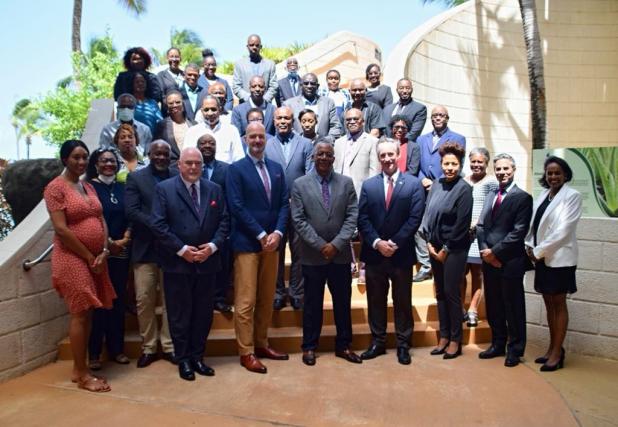
Chief Justice Sir Patterson Cheltenham (fifth from right) with British High Commissioner Scott Furssedonn-Wood (sixth from right) and US Chargé d’Affaires David Schnier (fourth from right) with members of the judiciary.
US, UK Gov’ts support sentencing guidelines training
THE Governments of the United States of America and the United Kingdom continue to provide assistance to the criminal justice system in Barbados by supporting the introduction of sentencing guidelines.
The Barbados Sentencing Guidelines Project, funded by the US/UK Criminal Justice Reform Project, conducted workshops on June 17-18 for the Judiciary of Barbados, the Department of Public Prosecutions, the Office of
Police Prosecutors, and the Barbados Bar Association on seven proposed guidelines for the offences of rape, firearms, drugs, robbery, theft, burglary and aggravated burglary.
The guidelines were drafted by the Barbados Sentencing Guidelines Committee, which includes the Chief Justice of Barbados, the Honorable Sir Patterson Cheltenham, K.A., members of the judiciary, prosecutors, defence attorneys, and academics. Criminal
justice stakeholders and the general public were also invited to provide comments and feedback on the proposed guidelines through two public consultation phases.
During the training of the judiciary on Saturday, June 18, British High Commissioner Scott Furssedonn-Wood expressed appreciation that the concept of sentencing guidelines is becoming a reality in Barbados as it is one of the areas of greatest public interest and comment. He explained, “These guidelines are not just for judges, they are for every victim and witness of crime, every defendant, every prosecutor and defence attorney and for every member of the public to demystify the sentencing process and bolster public confidence in the criminal justice system.”
U.S. Embassy Chargé d’Affaires David Schnier applauded the transformation and modernization of the Judiciary of Barbados and the development of an excellent, efficient, and well-trained team of judicial officers.
He added, “This train- ing on sentencing guide- lines is yet another step towards achieving that high standard of judicial professionalism by sharpening your tools of legal knowledge, skills and techniques on sentencing.”
Chief Justice Cheltenham expressed gratitude to the members of the judiciary for participating in the training, as well as to prosecutors and defence attorneys who also at- tended.
He said, “The success of this initiative is dependent on the hard work and commitment of everyone in this room. Your feedback will be essential in ensuring that we get this right and work towards creating even more guidelines which are reflective of the needs of the Barbadian public, particularly those who have been victims of crime.”
Sentencing guidelines are an important aspect of the criminal justice system. They achieve a uniform approach to sentencing practice, promote greater transparency and ensure greater consistency in sentences passed. The proposed
guidelines provide factors the court should take into account that may affect a sentence and requires the court to start the sentencing process by assessing the harm that has been caused to the victim of a crime.
The launch and implementation of the sentencing guidelines are expected to increase public confidence in the criminal justice system as it relates to improving sentencing practices in Barbados.
